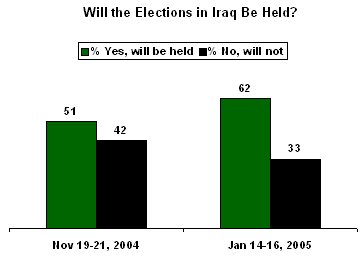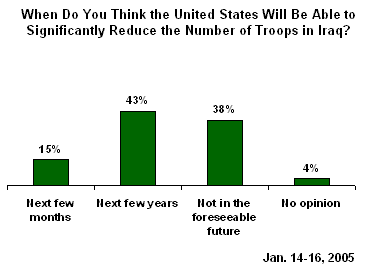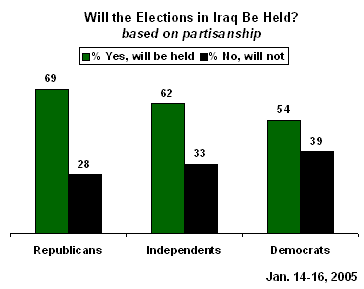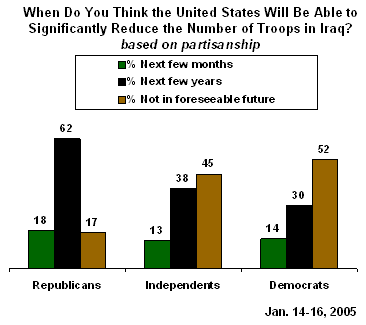GALLUP NEWS SERVICE
PRINCETON, NJ -- With elections in Iraq still on course for Sunday, more Americans have come to believe the elections will actually take place. Few expect that the results will allow the United States to significantly reduce its troops immediately, but a majority of Americans say the elections will allow troop withdrawal at least within the next few years. Expectations about troop withdrawal are highly related to people's partisan orientations, with Democrats much more pessimistic than Republicans.
Earlier Gallup surveys show an American public that is highly skeptical about the future of Iraq -- with most people saying peace and internal security will not be established in the next year, and a majority saying a democratic form of government will not be established.
Election Predictions
The latest CNN/USA Today/Gallup survey of Americans' attitudes about the Iraqi elections, conducted Jan. 14-16, shows that 62% of Americans predict the elections in Iraq will take place, while 33% say they will not. These results are more positive than what Gallup found in November, when only 51% expected the elections would occur.

The poll also shows that most Americans are skeptical about any short-term impact the elections might have on the need for U.S. troops in Iraq. Just 15% think the elections will allow the United States to significantly reduce its troop level in that country within "the next few months," while 38% don't expect it to facilitate reductions "for the foreseeable future." Another 43% take a middle position, that the elections will allow troops to be withdrawn in "the next few years."

Partisanship and Opinions About Iraq
The current poll shows that people's partisan orientations are highly correlated with their views about the Iraqi elections. Overall, Republicans are more likely to say the elections will occur (69%) than are independents (62%) and Democrats (54%).

Democrats and independents are also much more pessimistic than Republicans about the elections' impact on possible U.S. troop reductions. Fifty-two percent of Democrats and 45% of independents say the elections will not allow the United States to significantly reduce its troop strength "for the foreseeable future," while only 17% of Republicans feel that way.

There are few differences among the three partisan groups as to whether U.S. troops can be withdrawn in the next few months, with only 18% of Republicans, 13% of independents, and 14% of Democrats expressing that view.
The major differences are found in the percentage of each group who say troop reduction is possible within the next several years -- 62% of Republicans, compared with 38% of independents and 30% of Democrats.
Americans Dubious About Iraq's Future
In a poll conducted last November, Americans were skeptical about whether most Iraqis would treat the elections as legitimate. Only 42% of Americans thought the Iraqis would, while 52% thought they would not.
If the elections in Iraq are held next January, do you think most Iraqis will -- or will not -- accept the outcome as legitimate?
|
Yes, will |
No, will not |
No opinion |
|
|
|
|
|
|
|
2004 Nov 19-21 |
42% |
52 |
6 |
In a survey earlier this month, 71% of Americans said it would be
unlikely that peace and security would be established in Iraq in
the next year, essentially no different from the opinion expressed
last May.
23. Please tell me whether you think each of the following is very likely, somewhat likely, somewhat unlikely, or very unlikely to happen in Iraq in the next YEAR. [ITEMS ROTATED]
A. Peace and internal security will be established
|
Very |
Somewhat |
Somewhat |
Very |
No |
|
|
|
|
|
|
|
|
|
2005 Jan 7-9 |
6% |
22 |
23 |
48 |
1 |
|
|
|
|
|
|
|
|
2004 May 21-23 ^ |
7% |
22 |
25 |
44 |
2 |
|
|
|
|
|
|
|
|
^ Asked of a half sample |
|||||
B. A democratic form of government will be established
|
Very |
Somewhat |
Somewhat |
Very |
No |
|
|
|
|
|
|
|
|
|
2005 Jan 7-9 |
15% |
32 |
23 |
29 |
1 |
|
|
|
|
|
|
|
|
2004 May 21-23^ |
12% |
30 |
23 |
32 |
3 |
|
|
|
|
|
|
|
|
^ Asked of a half sample |
|||||
In the same Jan. 7-9 poll, 52% of Americans said it was unlikely that a democratic form of government would be established in Iraq in the next year, while 47% thought it was likely -- but only 15% said very likely. These views are slightly more positive than those expressed last May, but they continue to indicate that most Americans are not especially confident the Iraqis will have a democratic form of government by the end of the year.
War Attitudes on the Eve of Elections
Other indications of the public's mood on the eve of the Iraqi elections show a slight majority (52%) of Americans believing it was a mistake to go to war with Iraq in the first place (Jan. 14-16 poll). The same poll found an almost evenly divided public on whether President George W. Bush has a clear plan for handling the situation in Iraq: 49% of Americans say he does; 50% say he does not. A Jan. 7-9 poll found only 42% of Americans approving of the way Bush is handling the Iraqi situation, and 56% disapproving -- the highest disapproval rating on this issue since June of last year.
Survey Methods
Results are based on telephone interviews with 1,007 national adults, aged 18 and older, conducted Jan. 14-16, 2005. For results based on the total sample of national adults, one can say with 95% confidence that the maximum margin of sampling error is ±3 percentage points. In addition to sampling error, question wording and practical difficulties in conducting surveys can introduce error or bias into the findings of public opinion polls.
26. Just your best guess, do you think elections in Iraq will -- or will not -- be held at the end of January as scheduled?
|
Yes, will |
No, will not |
No |
|
|
|
|
|
|
|
2005 Jan 14-16 |
62% |
33 |
5 |
|
|
|
|
|
|
2004 Nov 19-21 ^ |
51% |
42 |
7 |
|
|
|
|
|
|
^ WORDING: Just your best guess, do you think elections in Iraq will -- or will not -- be held on January 31, 2005 as scheduled? (After the poll was put into the field, the scheduled date was moved to Jan. 30, 2005.) |
|||
27. Suppose the elections in Iraq are held as scheduled at the end of January. Do you think these elections will allow the U.S. to significantly reduce the number of troops it has in Iraq -- in the next few months, in the next few years, or will they not allow the U.S. to significantly reduce the number of troops it has in Iraq for the foreseeable future?
|
|
|
Not for the |
|
|
|
|
|
|
|
|
|
2005 Jan 14-16 |
15% |
43 |
38 |
4 |
